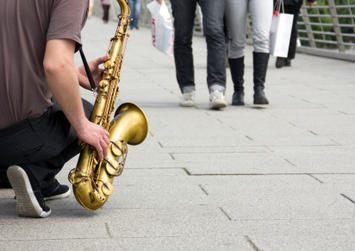
By Richard Reep
Carmen Ruest, Director of Cirque de Soleil, recently revealed her start as a street performer, or busker, in Canada. The interviewer did not hesitate to contrast this with the current state of Downtown Orlando, which forbids street performers. Eliminating this ban will improve Orlando's urban consciousness, both downtown and elsewhere, and improve the city in general.
The Downtown Development Board (an arm of city government) has long stated its mission to promote arts-based businesses downtown. In the nineties, this board even had special incentives for independent creative enterprises to encourage a local arts scene. Only later did the city give in to the temptation to go for the big box retailers, and all bets were suddenly off.
Meanwhile, street performers continue to provide local color that graces cities of Europe, Canada, and elsewhere in the United States. Often, tales of tourists include encounters with creative street performers that make the trip; willingly parting with some money for a brief but engaging performance can be a bit of spice in an otherwise overstimulating experience. Such spontaneity is not allowed in Orlando, which ranks among the world’s top tourist destinations.
The street performer connects with the pedestrian in a unique way: not in the safety of the theater, not in a venue where tickets are taken, and not at a scheduled time. Instead, the performer seeks the audience, and gives the performance first, then hopes for compensation. This puts the onus on the performer to be compelling, original, and brief. In short, the performer has got to have soul. There is no better training ground for future actors and entertainers than the street.
Meanwhile, Orlando's downtown arts scene is slowly gentrifying, with a variety of galleries and even artist's studios. On the third Thursday every month, artists and art lovers from Avalon tour galleries up Pine Street, along Orange Avenue to the City Arts Factory, and some are even brave enough to filter up Magnolia Street to Redefine Gallery.
However, for anyone who has visited other downtowns, this can be a rather antiseptic experience. If Orlando is serious about Downtown as a tourist venue, perhaps the city should focus a little more on the quality of the experience.
Right now, spontaneity is missing from Downtown Orlando. The notion of public space is founded on the ability of citizens to express themselves within this space, and by encouraging positive forms of self-expression. If Orlando follows this venerable tradition downtown, the city might be surprised to find the benefits may far outweigh any disadvantages.
Certainly with the city's budget cuts, the Police Department has more important places to prioritize cops' time rather than busting illegal street performance. By legalizing this activity, the shrinking resources of law enforcement can be spent elsewhere, thus improving the general safety and security of the city.
To encourage the art scene, Downtown has instituted Third Thursdays, an art walk that mimics the ones popularized in the nineties in Scottsdale, Arizona and elsewhere. To experiment with street performers, the pathway taken by the Third Thursdays crowd would be an excellent place to start. If the city were to license street performers and monitor the activity along Pine Street and Orange Avenue, it could be a testing ground for this idea. Given the crowd's affinity for art, street performers could become another attraction in itself. After all, the walk between galleries includes a lot of blank sidewalk time.
For Downtown Orlando, it is time to fight fire with fire. Disney is successful because it recreates that lost-in-time feeling of walking in an urban environment and encountering balloon artists, saxophonists, mimes, and other characters. But at Disney and other theme parks this is all carefully choreographed and timed. If the downtown folks were to provide a spontaneous alternative, the city would have a new parking problem as people come to experience this. This proposal is not as ambitious as all that; it is simply to try it for the art walk. That's once a month on three or four blocks. The city might even collect a license fee, and then let them do their thing.
For lovers of performance art, the City of Orlando has proposed a new Performing Arts venue to be financed by bond money. However, the City's Performing Arts Center boosters cannot find anyone else interested in funding this huge trophy. There may be some karmatic justice in the relationship between the City's distaste for street performers and the City's evaporating dream of a Performing Arts Center. By allowing and regulating street performers, the City might find itself with a newfound interest in performing arts in general.
The urban consciousness of the city can be measured in many ways, and one way to measure it is how the citizens of the city use its public spaces. Orlando, with its torpid downtown, has little to lose by experimenting with street entertainment. Perhaps this will help the soul of the city come back to life, and create what has always been missing – an authentic sense of place for the region.
Richard Reep is an Architect and artist living in Winter Park, Florida. His practice has centered around hospitality-driven mixed use, and has contributed in various capacities to urban mixed-use projects, both nationally and internationally, for the last 25 years.













Do you know what is the
Do you know what is the basis for forbidding street performances in downtown Orlando?
Street performers are protected by the First Amendment. While such activities can be regulated (you can't yell fire in a crowded theater), they can not be banned or forbidden.
I don't see any provision in the Orlando city code expressly banning street performances, so I'm very curious about how the city or the Downtown Development Board or whoever is forbidding constitutionally protected activity.